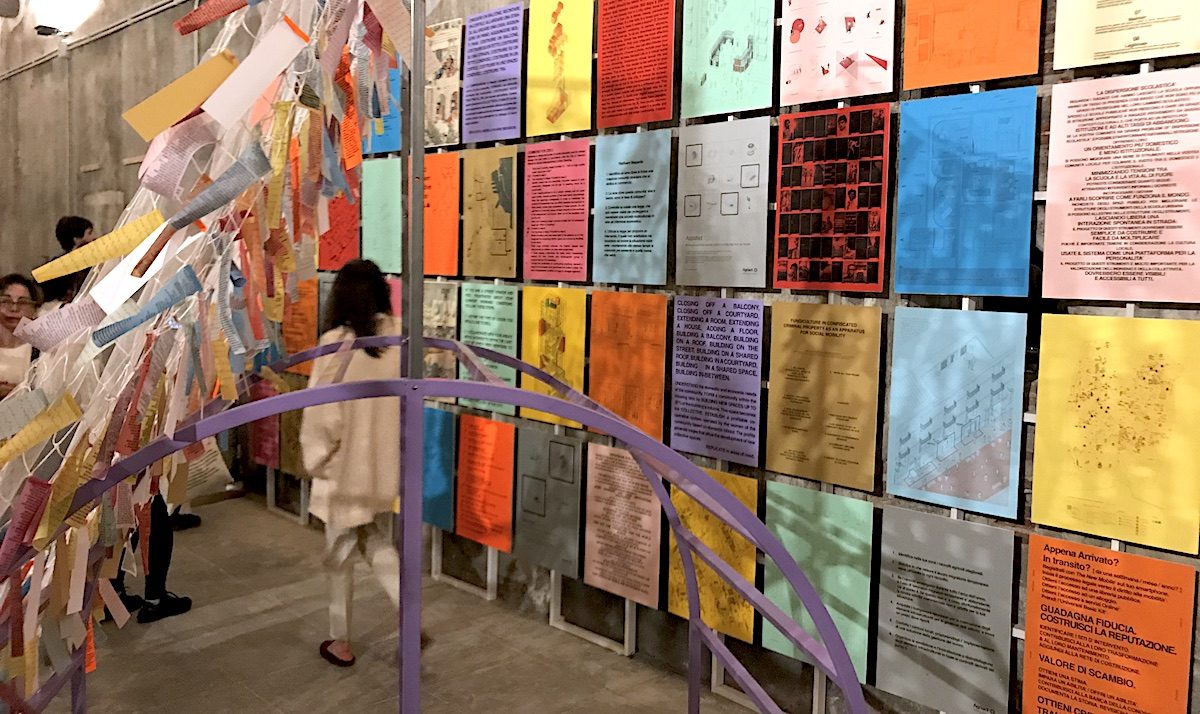As a result of the COVID-19 pandemic and its unprecedented impact worldwide, many of these exhibitions and events have been postponed or canceled.
Yes, there are a number of biennials/triennials on offer around the globe this year. These are tried and tested and mostly located within easy range of Europe. The Liverpool Biennial, Riga Biennial Berlin Biennale, Folkestone Triennial and Manifesta 13 in Marseille top our list. Here they are by date.
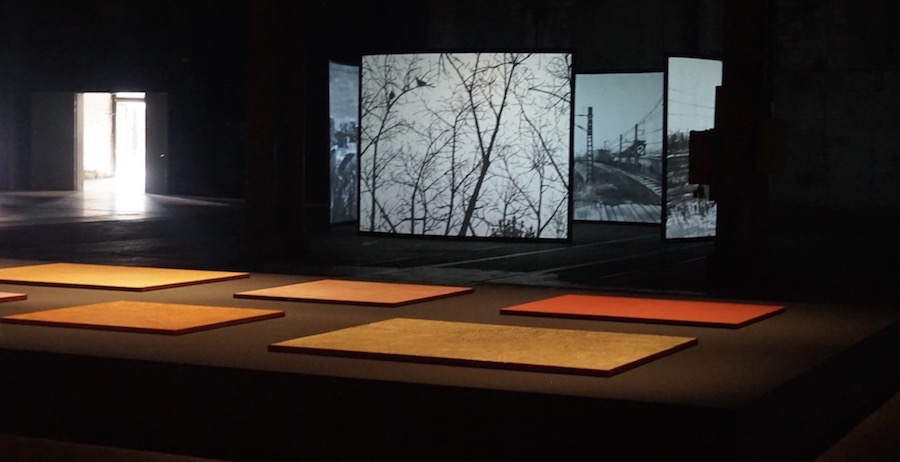
Biennale of Sydney
March 14–June 8
Sydney, Australia: The
is the largest exhibition of contemporary art in Australia. Brook Andrew has been appointed artist-curator for the 22nd Biennale of Sydney. The focus is on issues facing indigenous and First Nation peoples, along with climate change leading topics. Titled “Nirin,” or “edge,”. The performance program entitled “Wir,” or sky comes from the curator’s ancestors, the Wiradjuri people of central western New South Wales.
‘The Biennale plays an indispensable role in Australia’s engagement with the world, and a meaningful role in the life of the nation. In the year of the 250th anniversary of Cook’s landing, art is an essential catalyst for change.
The Biennale of Sydney recently announced the full list of artists, creatives and collectives participating (see link). Artist- and First Nations-led, the Biennale of Sydney will present an expansive exhibition of contemporary art and public programming that connects local communities and global networks, offered free to the public from 14 March to 8 June 2020.
Glasgow International
April 24–May 10
Glasgow, Scotland
Glasgow International is Scotland’s largest festival for contemporary art, taking place over three weeks every two years across the city of Glasgow. Renowned as a centre for contemporary art, the festival draws on the city’s strengths as a vibrant and distinctive centre of artistic production and display. Combining the characteristics of a visual arts biennial with an open submission model for artists and curators based in the city, GI is a truly unique event in the European cultural calendar.
The theme of the 2020 edition of the Glasgow International is “Attention.” It will include new commissions by the UK and international artists, including Martine Syms and Bodys Isek Kingelez, as well as exhibitions by artists Urara Tsuchiya, Eva Rothschild, Dawn Mellor, Ingrid Pollard, and others. The theme asks artists to consider where our attention is focused amid the distracting noise of contemporary life. Glasgow International’s director, Richard Parry, and curator Poi Marr also ask: “How we attend to others whom we care for, as well as ourselves?”
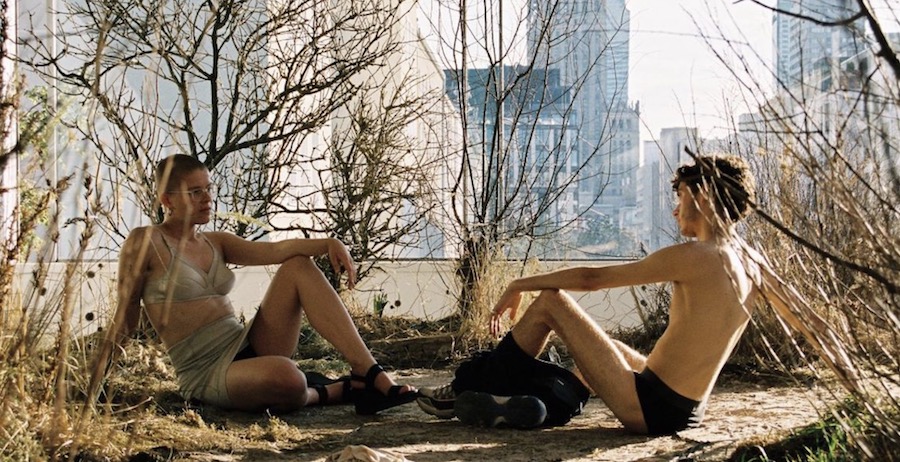
Riga Biennial
May 16–October 11
Lina Lapelytė, Vaiva Grainytė and Rugilė Barzdžiukaitė,
Sun and Sea (Marina)
(2019). Performance, Lithuanian Pavilion at the 58th Venice Biennial, 2019. Photo by Laima Stasiulionytė.
Riga, Latvia
The second edition of the Riga International Biennial of Contemporary Art titled “RIBOCA2: And Suddenly It All Blossoms.” is curated by Rebecca Lamarche-Vadel. This the second Riga International Biennial of Contemporary Art (RIBOCA) is a significant new biennial in Latvia RIBOCA2 rails against cynicism and political despair, transforming fear into opportunity and peril into vitality In a global context of ecological, economic and political upheavals, RIBOCA2 channels the notion of re-enchantment as both a frame for understanding the present and a mindset for developing desirable futures. Borrowing its title from the Latvian poet Māra Zālīte (b. 1952), the exhibition re-imagines ways of being human and explores other paths for making relationships. Offering alternatives to apocalyptic narratives, RIBOCA2 rails against cynicism and political despair, transforming fear into opportunity and peril into vitality.
The project draws its inspiration from the history of Riga, Latvia and the Baltic States, where “worlds have ended” many times since the 13th century, across a stream of occupations, wars and economic crises. Despite these traumas, human and non-human solidarities have been maintained for centuries, through written and oral poetry, acknowledgements of celestial rhythms and practices of healing. The title of the show also links to the Latvian tradition of the dainas, a poetic form of resilience. These short poems, primarily created by women, deal with themes central to the Biennial.
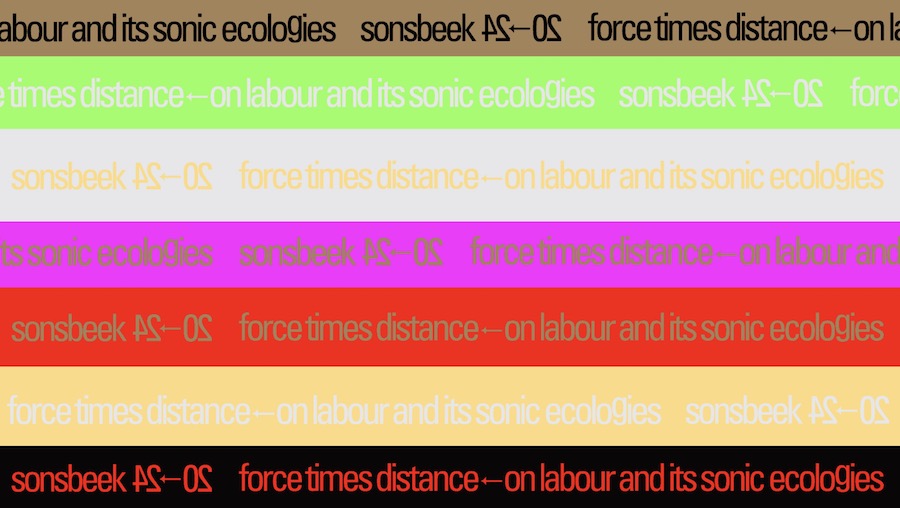
Sonsbeek
June 5–September 19
Arnhem, Netherlands
The 12th edition of the Sonsbeek quadrennial, which will run from June 5 to September 13, 2020, under the auspices of artistic director Bonaventure Soh Bejeng Ndikung and his team of co-curators Antonia Alampi, Amal Alhaag, Zippora Elders, Aude Christel Mgba, and Vincent van Velsen. Overseen by the new general director Steven van Teeseling, the Sonsbeek foundation will explore the elasticity of the large-scale temporary art event format and connected conditions of artistic labour, popularized and capitalized on by many biennials and other international art events.
In terms of exhibition-making, Sonsbeek aims to decelerate the traditional artistic practice surrounding large-scale art exhibitions, to achieve a long-term reciprocal relation between and dedication to artists, institutions, place and audiences. In an age of extreme acceleration and ephemeral interactions, shifting the format in which these large-scale art events take place is all too relevant. Through the new Sonsbeek format, Ndikung, together with his curatorial team and contributors, will delve deeper into working conditions that are geared towards not just one event—as is usually the case—but towards an ongoing engagement for five years.
In this new, more sustainable form, Sonsbeek will abandon the usual rhythm of contemporary art production and exhibition, and instead stretch out in a continued public process until 2024, thereby consolidating and encapsulating two editions. This format will, first and foremost, create room for the invited artists and collaborators to develop, but also for the curatorial and production teams to deepen their research, offering the possibility of engaging with the local scenes and communities in a more profound way. A prolonged, elastic, expanded notion of a temporal art project.
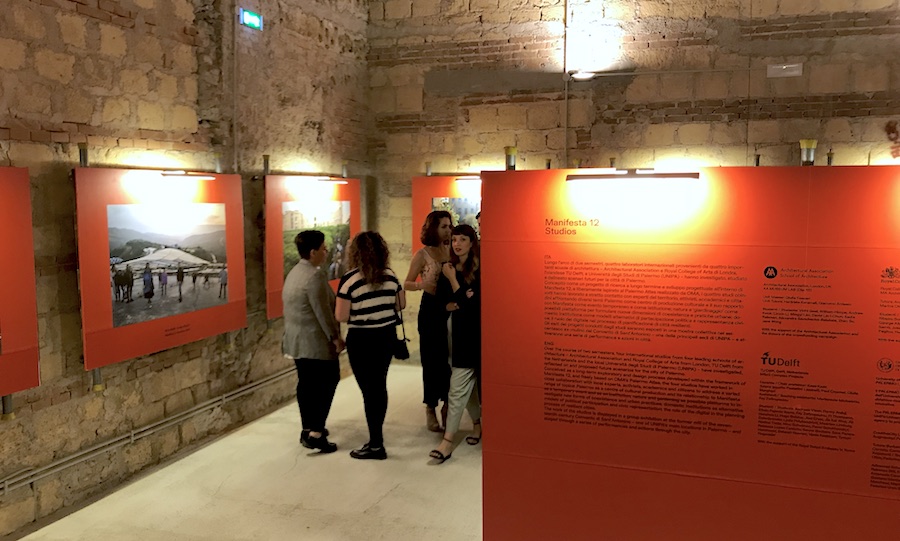
Photo: P C Robinson © Artlyst 2018
Manifesta 13
June 7–November 11
Marseille France
Manifesta is the European Nomadic Biennial, which originated in the early 1990s in response to the political, economic, and social change following the end of the Cold War and the subsequent steps towards European integration. Manifesta has developed into a platform for dialogue between art and society by inviting the cultural and artistic community to produce new creative experiences with, and for, the context in which it takes place. Manifesta rethinks the relations between culture and society investigating and catalysing positive social change in Europe through contemporary culture in a continuous dialogue with the social sphere of a specific place.
Manifesta was founded by the Dutch art historian, Hedwig Fijen. Each new edition is fundraised individually and managed by a mix of a permanent international team and local specialists. Manifesta is working from its offices in Amsterdam and Marseille.
Previous Editions: Rotterdam(1996), Luxembourg (1998), Ljubljana(2000), Frankfurt (2002), San Sebastian (2004), Nicosia (2006 – cancelled), Trentino-South Tyrol (2008), Murcia in dialogue with northern Africa (2010), Limburg (2012), St. Petersburg (2014), Zurich (2016) and Palermo (2018). The upcoming editions will take place in Marseille (2020) and Pristina (2022).
For its thirteenth edition, Manifesta takes place for the first time in France in Marseille in 2020. There could be no better city than Marseille to expand further Manifesta’s research and discussion about the challenges Europe is facing today. Manifesta 13 Marseille proposes to work with existing cultural institutions and associations, both symbolically and practically, by introducing different voices while expanding their narratives. With this ambition, Manifesta 13 Marseille will unfold through site-specific artistic commissions, performances, and urban interventions to imagine new forms of being together: Traits d’union.s.
The Manifesta 13 headquarters, Espace Manifesta 13, are located in one of the most iconic historical and central building in Marseille, former Espace Culture in 42 la Canebière. Space will be one for encounters and exchange, welcoming the neighbourhood and its habitants. Manifesta 13 Marseille’s Artistic Team will create programming consisting of exhibitions, lectures, debates, artist talks and will invite actors from across the cultural sphere to take over the former Espace Culture.
Helsinki Biennial
June 12–September 27
Helsinki Biennial is an international art event that will bring outstanding contemporary art to maritime Helsinki. The first Helsinki Biennial will be held in summer 2020 in the unique surroundings of Vallisaari Island.
Helsinki Biennial will present the highlights of international art from Finland and around the world to Helsinki’s residents and tourists. There will be workshops, multidisciplinary art performances and a programme of associated events on Vallisaari Island and elsewhere in Helsinki.
Vallisaari Island is located between the open sea and the urban landscape. Helsinki Biennial’s artworks will be built on an island, which is layered in cultural history and has returned to nature, in a way that respects its environment and buildings. Helsinki Biennial is based on sustainability and responsibility, and these values are being appreciated as much as possible in the implementation of the event.
Helsinki Biennial is free to attend.
The central theme of Helsinki Biennial 2020 is interdependence: every action and thing has an impact on something else and supports the whole. The curators of Helsinki Biennial 2020 have given the event the subtitle: The Same Sea.
“The ecological crisis means we are now on the cusp of enormous changes, and this is defining our common future everywhere. The biennial’s subtitle, The Same Sea, refers to this situation, which concerns everyone but affects different places in different ways. Like the sea, it is a complex, inconstant entirety that bypasses all boundaries and appears different depending on the perspective,” say Pirkko Siitari and Taru Tappola, head curators of the biennial.
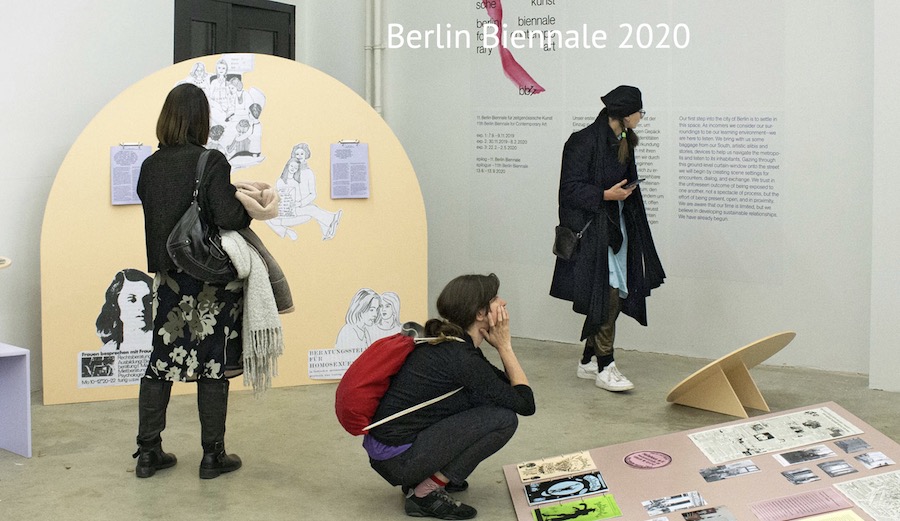
11th Berlin Biennale
June 13–September 13
The 11th Berlin Biennale unfolds as a process through three sequential moments: exp. 1, exp. 2 and exp. 3. From June 13 to September 13, 2020, the upcoming edition of the Berlin Biennale brings forth all experiences at various venues. Our first step into the city of Berlin was to settle into the ground-level space of a tower belonging to the architectural complex of ExRotaprint in the neighbourhood of Wedding. In autumn 2019 we presented exp. One there. For exp. 2, we have invited Virginia de Medeiros and the Feminist Health Care Research Group (Inga Zimprich/Julia Bonn) to share the space.
What kind of beast is a crowd? How does a pulsating collective body press against those within, outside, or underneath it? In what way are the powers of dissident bodies being incited today? Virginia de Medeiros and the Feminist Health Care Research Group (Inga Zimprich/Julia Bonn) activate the ExRotaprint space, touching these questions through radically different considerations of the sexual politics and the care of both the collective and isolated body. What was Flávio de Carvalho looking for in 1931 on the streets of São Paulo when he decided to walk through the crowd of a Corpus Christi procession? Shortly afterwards, the Brazilian artist published a book with an analytical description of the incident, which he titled Experiência n. 2 [Experience no. 2]. Nevertheless, it is possible to think through and beyond this intervention—that almost led to the artist being lynched by an angry mob—by asking not only how to save ourselves, survive, or become stronger but also what it means to be a body today.
EVA International
July 3–October 11
Limerick, Republic of Ireland
Limerick, Republic of Ireland hosts the 39th EVA International programme is being developed about the ‘Golden Vein’, a 19th-century descriptor for the bountiful pastures of the Limerick / Tipperary region in the mid-West of Ireland (more commonly referred today as ‘Golden Vale’). The reference belongs to the historical perspective of seeing the land as a resource to be tapped, exploited, and commercialised through industrialised agricultural production and global trade. The Golden Vein is the starting point for thinking through ideas of land and its contested values within the context of Ireland today.
Opening on 4 September 2020 and continuing until 15 November 2020, the 39th EVA International will present a programme of artist commissions, presentations, and educational projects across venues in Limerick city and beyond. The programme will include a Guest Programme curated by Merve Elveren, some Platform Commissions selected by Merve Elveren and Anne Tallentire, as well as several adjacent commissions and projects directly initiated by EVA and collaborating partners. Of her plans for the Guest Programme, Merve Elveren has written: “In a global climate of political and economic dispossession, what does ‘land’ stand for? The word evokes as much guilt and helplessness as peace of mind, harbours self-realization and fulfilment, yet, at the same time, bridges deprivation and collectivity. Veined by corresponding and conflicting intensities, the notion of land holds the potential to challenge the status quo by addressing both the present and the future. For EVA 2020, I would like to imagine a temporary site for revisiting critical historical models and actions from the recent past and bringing together examples from today with a view to utilizing and re-interpreting shared memories and material histories. To this end, I hope to collaborate with mechanical archives of local collective social movements and organizations, and ultimately ignite a conversation on what we can learn from and with them today.”
The 39th EVA International is the first of three biennials that fall within the scope of EVA’s Strategic Plan 2019 – 2024
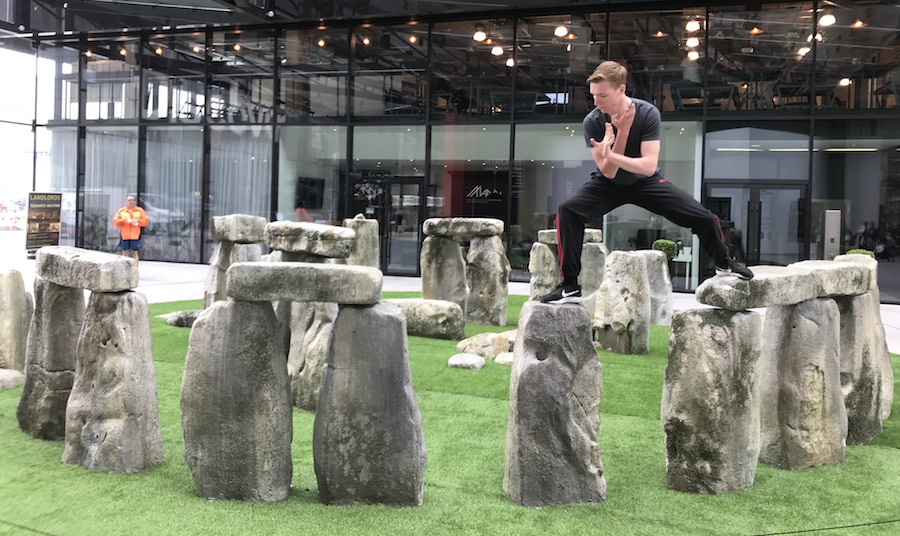
Liverpool Biennial
July 11–October 25
Liverpool, UK Liverpool Biennial 2020
The Stomach and the Port
Liverpool UK
Liverpool Biennial is the UK’s largest festival of contemporary visual art. Taking over unexpected and public spaces, historic sites and art galleries, the Biennial has been transforming the city through art for over two decades. The 11th edition, The Stomach and the Port explore notions of the body and ways of connecting with the world. More than 50 international artists have been invited to respond to this theme within the context of Liverpool. A dynamic programme of free exhibitions, performances, screenings and fringe events unfolds over the 15 weeks, shining a light on the city’s vibrant cultural scene.
Liverpool Biennial 2020: Manuela Moscoso curates the Stomach and the Port with artistic director Fatos Üstek and the Liverpool Biennial team.
Folkstone Triennial
September 5–November 8
Folkestone, UK
The fifth edition of the Folkestone Triennial titled “The Plot,” refers to both a narrative and a conspiracy, or materially to plot a course or a graph. Curated by Lewis Biggs, it includes 20 new commissions and will present artworks in public spaces across the town on the south coast of England. As in previous editions, a selection of the works remains on long-term loan from the artists.
Folkestone Triennial is the flagship project of Creative Folkestone and the largest exhibition of newly commissioned work presented in the UK. Artists are invited to use the town as their gallery, utilising public spaces to create striking new art that reflects issues affecting both the city and the full world. Four Triennials have taken place attracting more than 440,000 visitors. Artists commissioned include Cornelia Parker, Christian Boltanski, Jeremy Deller, Martin Creed, Mark Wallinger, Cristina Iglesias, Richard Wilson, Andy Goldsworthy and AK Dolven.
Since its inception in 2008 (with Andrea Schlieker as the curator), Folkestone Triennial has rapidly established itself as a significant event in the international calendar of recurring art exhibitions. It has done so by being one of a small number of contemporary art exhibitions that set out to affect the art programme itself, changing the character of the place in which they occur. These exhibitions create a spirit of place through their collection of artworks, through changes to the physical environment and primarily through changes in the thinking of the communities with which they work. In doing so, they transform a village, a town, a city, a community.
Top Photo: Manifesta 2018 P C Robinson © Artlyst

